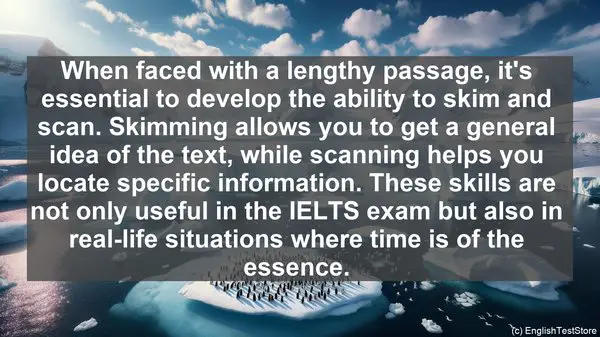Introduction: The Power of IELTS Reading Materials
Today, I want to talk about the incredible impact that IELTS reading materials can have on your overall English skills. Not only are they a crucial component of the IELTS exam, but they also provide a wealth of knowledge and language practice. By employing the right strategies, you can maximize the benefits of these resources.

1. Skim and Scan: The Art of Quick Reading
When faced with a lengthy passage, it’s essential to develop the ability to skim and scan. Skimming allows you to get a general idea of the text, while scanning helps you locate specific information. These skills are not only useful in the IELTS exam but also in real-life situations where time is of the essence.

2. Active Reading: Engage with the Text
Reading passively won’t do much to improve your language skills. Instead, adopt an active reading approach. This involves highlighting key points, underlining unfamiliar words, and jotting down questions or thoughts. By actively engaging with the text, you’ll not only understand it better but also internalize the language structures and vocabulary.
3. Vocabulary Expansion: Beyond the Dictionary
While a dictionary is a valuable tool, don’t solely rely on it for vocabulary expansion. When you encounter an unfamiliar word, try to understand its meaning from the context. Look for clues in the surrounding words or sentences. This way, you’ll not only learn the new word but also its usage and collocations.
4. Reading Speed: Finding the Right Balance
Reading speed is a crucial factor, especially in the IELTS exam. While it’s important to read at a reasonable pace, don’t sacrifice comprehension for speed. Gradually work on increasing your reading speed through regular practice, but always prioritize understanding the content.
5. Variety is Key: Explore Different Text Types
Don’t limit yourself to a single genre or topic. Explore a wide range of text types, such as newspaper articles, academic papers, or even fiction. Each type has its unique language features and style. By diversifying your reading materials, you’ll expose yourself to various linguistic elements, enhancing your overall language proficiency.
6. Post-Reading Reflection: Summarize and Analyze
After finishing a reading passage, take a few moments to reflect on it. Summarize the main points in your own words. Analyze the author’s arguments or the structure of the text. This post-reading reflection not only reinforces your understanding but also hones your critical thinking and analytical skills.
7. Collaborative Learning: Discuss and Debate
Reading doesn’t have to be a solitary activity. Engage in discussions or debates with fellow learners or even native speakers. This not only provides different perspectives but also challenges your language abilities. Through these interactions, you’ll not only improve your speaking skills but also gain insights into cultural nuances.
8. Time Management: Set Realistic Goals
When it comes to reading, time management is crucial. Set aside dedicated time for reading practice. Break down your sessions into manageable chunks. Set realistic goals, such as completing a certain number of pages or articles. By having a structured approach, you’ll make consistent progress.
9. Test Yourself: Mock Exams and Practice Questions
To gauge your progress and familiarize yourself with the IELTS exam format, regularly take mock exams or practice questions. This not only helps you identify areas of improvement but also boosts your confidence. Treat these practice sessions as opportunities for learning and growth.
10. Beyond the Text: Explore Related Resources
Reading materials often provide a starting point for further exploration. If a topic interests you, delve deeper by exploring related resources. This could include watching videos, listening to podcasts, or even attending webinars. By expanding your knowledge beyond the text, you’ll develop a well-rounded understanding of the subject.
